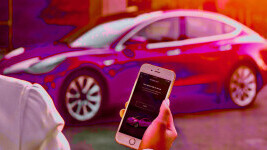
Is there ever a week without some kind of fuck up at Tesla? If it was a lesser brand, I’d think it was a ploy for publicity, but the latest app bug was way too severe for that.
Last Friday, the BBC wrote that about 500 users reported an error on the Tesla app at around 4:40 ET (10:40 CET) that left car owners unable to unlock the doors or start their cars.
Since the company has no PR team (Elon sacked them), it was Elon Musk to the rescue. So he went on Twitter to keep stranded drivers updated. I’m glad he was able to take a break from tweeting about the acronym for his Texas Institute of Technology & Science to help those poor souls.
So when a car journo sent out a message to the Twitterverse, Elon Musk was ready to listen:
I’m experiencing 500 server error to connect my @tesla Model 3 on my iOS app in Seoul, S.Korea. Seems like this is a worldwide issue. @elonmusk
— Jaehwan Cho 조재환 (@hohocho) November 19, 2021
Checking
…— Elon Musk (@elonmusk) November
19, 2021
Thanks again
Elon!— Jaehwan Cho 조재환 (@hohocho) November
20, 2021
To Musk’s credit, the solution was found quickly — so the app bug didn’t end up as a total catastrophe.It’s also fair to point out that you can operate a Tesla without the app: there’s a key fob for Model S and Model X and a key card for Model 3.
But of course, you’re unlikely to be carrying these with you when you’re already using the app! And this is where the best plans fail, when the unexpected happens.
The failure of the app exposes bigger problem with IoT connected devices
Rest assured, the Tesla problem is resolved. But I can’t help wondering why Tesla didn’t learn from the smart lock and connected device fiascos that have plagued other industries.

The problem is that connected devices, as much as we’d like to think otherwise, are fallible, and they’re likely to fail at the worst possible time.
I’ve been an IoT journalist for a fair while and there are two smart devices I tell people never to buy — door locks and pet feeders. I’ve written countless stories about smart locks that either inadvertently lock people in, out, or don’t lock at all.
Whether it’s arriving at a rented Airbnb only to find yourself locked out due to an app glitch, or discovering all your rental properties have been simultaneously unlocked because of a software upgrading error — it happens far too often.

Also on my internet of shit list is smart pet feeders. Take one brand: the Petnet automated pet feeders should feed your cat using preset timers controlled by an app. Great idea… until they experienced a big system failure in 2016, then again in 2020. For most loving pet owners, that’s just too big a risk to take.
Tesla’s got bigger things to deal with
So, yeah, the Tesla app debacle is small fry, really. It’s not like a Tesla bricking it on a highway.
I’d add that any good smart lock design includes backup strategies and fail-safes. An example might be allowing a user to store two versions of firmware on the same device, so if one does not operate correctly, they can revert to the other — just like how escalators still provide their basic function while broken.
At least Tesla owners could operate their cars by other means — they just didn’t have them handy at the time.
But we’re entrusting Tesla tech with an awful lot of tech that if it fails, has the ability to end lives. If they can’t get a simple connected app right, what does this mean for the long term?
Get the TNW newsletter
Get the most important tech news in your inbox each week.





